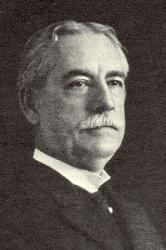Planning worship?
Check out our sister site, ZeteoSearch.org,
for 20+ additional resources related to your search.
- |
User Links
Person Results
William J. Kirkpatrick

1838 - 1921 Person Name: W. J. Kirkpatrick Composer of "[Any little corner, Lord]" in The Gem of Gems William J. Kirkpatrick (b. Duncannon, PA, 1838; d. Philadelphia, PA, 1921) received his musical training from his father and several other private teachers. A carpenter by trade, he engaged in the furniture business from 1862 to 1878. He left that profession to dedicate his life to music, serving as music director at Grace Methodist Church in Philadelphia. Kirkpatrick compiled some one hundred gospel song collections; his first, Devotional Melodies (1859), was published when he was only twenty-one years old. Many of these collections were first published by the John Hood Company and later by Kirkpatrick's own Praise Publishing Company, both in Philadelphia.
Bert Polman
William J. Kirkpatrick
Charles Edward Pollock
1853 - 1928 Person Name: C. E. Pollock Composer of "[Any little corner, Lord]" in Good Will Charles Edward Pollock USA 1853-1928. Born at Newcastle, PA, he moved to Jefferson City, MO, when age 17. He was a cane maker for C W Allen. He also worked 20 years for the MO Pacific Railroad, as a depot clerk and later as Assistant Roadmaster. He was a musician and prolific songwriter, composing 5000+ songs, mostly used in Sunday school settings and church settings. He took little remuneration for his compositions, preferring they be freely used. He produced three songbooks: “Praises”, “Beauty of praise”, and “Waves of melody”. In 1886 he married Martha (Mattie) Jane Harris, and they had three children: Robert, Edward, and a daughter. He died in Merriam, KS.
John Perry
=================
Pollock, Charles Edward. (Jefferson City, Missouri, 1853-1924). Records of Jefferson City indicate the following:
1897 clerk at depot; residence at 106 Broadway (with Mildred Pollock)
1904-1905 cane maker for C. W. Allen
1908-1909 musician; residence at 106 Broadway (with wife Matty)
1912-1913 residence at St. Louis Road, east city limits
--Wilmer Swope, DNAH Archives
Note: not to be confused with Charles Edward Pollock (c.1871-1924).
Charles Edward Pollock
B. C. Unseld

1843 - 1923 Composer of "[Any little corner, Lord]" in Praise Divine Benjamin Carl Unseld, 1843-1923
Born: October 18, 1843, Shepherdstown, West Virginia.
Died: November 19, 1923.
Buried: Elmwood Cemetery, Shepherdstown, West Virginia.
After leaving school at age 14, Unseld worked as a clerk in a country store. He received his first musical instruction around age 15, from a companion who had attended a singing school. He was shown the representation of the scale in the old Carmina Sacra, and had it sung for him. At the friend’s suggestion, he got permission from his pastor to practice on the church organ. Since both boys worked, their only chance to practice was after the store closed at 9:00 p.m., and occasionally at noontime. They went to the church together and took turns, one at the keyboard and the other at the bellows.
Shortly after the Battle of Antietam in September 1862, some of which Unseld witnessed, he left home and became a bookkeeper in the general offices of a railroad in Columbia, Pennsylvania. He sang in a choir, and gained further practice reading music. He rented a melodeon and spent much time in his room improvising on it. He bought a copy of Woodbury’s Harmony and Musical Composition, and studied it as well as he could without a teacher. He accepted an invitation to play the organ in the local Methodist church, on the condition that he received the tunes early in the week so he could learn them. This was his first position as an organist.
In the spring of 1866, he entered the Musical Institute in Providence, Rhode Island, conducted by Eben Tourjée (founder of the New England Conservatory in Boston, Massachusetts, and father of Lizzie Tourjée). There he studied voice, piano, organ, and harmony. After learning of Unseld’s business experience, Dr. Tourjée made him secretary of the school; in 1867, Unseld became the first secretary of the New England Conservatory.
Starting in 1870, Unseld attended schools led by Theodore F. Seward. There he met George Webb, Lowell Mason, James McGranahan, Charles Case, and other notables in the music community. In 1874, Unseld taught at Fisk University in Nashville, Tennessee, and helped train Fisk’s Jubilee Singers for their European trip. In 1877 and 1878, he was organist and choir master at St. James’ Episcopal Church, Lancaster, Pennsylvania.
In 1879, Unseld moved to New York City, and for 15 years taught, led choirs, composed and published. In New York, his musical headquarters was the publishing house of Biglow & Main Company, where he was in almost daily contact with the popular composers and teachers of the day: Ira Sankey, Horatio Palmer, Hubert Main, Robert Lowry, et al. In 1894, Unseld moved to Cincinnati, Ohio, and worked as an editor for the Fillmore Music House. In 1898, he moved to Dayton, Ohio, and worked in a similar capacity for the Lorenz Publishing Company. He moved back to New York City in 1901, then to Hagerstown, Maryland in 1905. He and his wife Sallie were apparently living in Tennessee as of 1920. Unseld’s works include:
The Choral Standard (New York: Fillmore Brothers, 1895)
Progress in Song, with E. T. Hildebrand (Cincinnati, Ohio: The Fillmore Brothers Company)
Unseld was inducted into the Southern Gospel Music Association Hall of Fame in 2004.
Sources--
Hall, pp. 239-44
Music--
Ancyra
Euphemia
He Is Risen
Hordville
Make Haste!
Meschach
Twilight Is Falling
Unseld
Wonderful Message
--www.hymntime.com/tch
B. C. Unseld


 My Starred Hymns
My Starred Hymns


